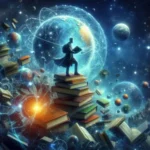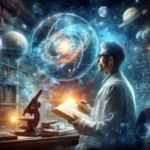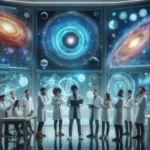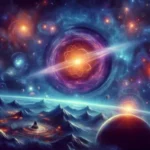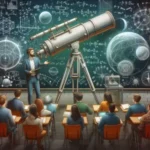In an age where information is abundant yet often superficial, the true treasure lies within the pages of books that delve deep into the realms of history, science, and beyond.
These volumes not only enlighten our minds but also ignite our imaginations, connecting us to the past and expanding our understanding of the universe. Whether you’re a history buff eager to uncover the intricacies of ancient civilizations, a science enthusiast fascinated by the wonders of the cosmos, or simply someone seeking a deeper understanding of the world around you, the right book can be a gateway to knowledge and inspiration. In this blog post, we will explore a curated selection of must-read titles that promise to enrich your intellect and provide fresh perspectives on the subjects that shape our lives. Join us as we unlock the doors to knowledge and discover the best books that every curious mind should have on their shelf!
1. Introduction: The Power of Books in Expanding Knowledge

Books have long been heralded as gateways to knowledge, serving as invaluable resources that empower readers to explore the depths of history, unravel the complexities of science, and venture into realms of thought and imagination. In an age where information is abundant yet often fleeting, the timeless pages of a well-crafted book offer a stability and depth that digital snippets simply cannot match. They invite us to slow down, reflect, and immerse ourselves in ideas that can shape our understanding of the world.
The power of books lies not just in their ability to inform, but in their capacity to inspire curiosity and foster critical thinking. Each page turned is a new opportunity to challenge our perspectives, ignite our passions, and kindle our creativity. From the ancient chronicles that tell the tales of civilizations past to the groundbreaking scientific treatises that pave the way for future discoveries, books are vessels of human thought, experience, and innovation.
In this blog post, we will delve into a curated selection of the best books across various genres—history, science, and beyond—that have the power to transform your understanding of the world around you. Whether you are a seasoned scholar or a curious newcomer, these recommendations will not only expand your knowledge but also enrich your life in profound ways. Join us as we unlock the doors to a treasure trove of wisdom waiting to be discovered, one book at a time.
2. Essential History Books: Understanding Our Past
When it comes to unraveling the complexities of our past, a well-chosen history book can serve as both a window and a mirror, reflecting the triumphs and tribulations that have shaped our world. Essential history books offer not just facts and dates, but also narratives that breathe life into the events that have molded societies, cultures, and civilizations. They enrich our understanding and enable us to draw connections between past and present.
One of the most celebrated works in this realm is **“Sapiens: A Brief History of Humankind” by Yuval Noah Harari**. In this thought-provoking book, Harari takes readers on a journey through the evolution of Homo sapiens, exploring how our species has come to dominate the planet. His engaging prose challenges conventional narratives and prompts readers to question the societal structures we often take for granted.
Another must-read is **“Guns, Germs, and Steel: The Fates of Human Societies” by Jared Diamond**. This Pulitzer Prize-winning book delves into the environmental and geographical factors that have influenced human development across continents. Diamond’s interdisciplinary approach weaves together elements of anthropology, biology, and history, providing a comprehensive analysis of why some civilizations have thrived while others have struggled.
For those intrigued by the nuances of political history, **“The Origins of Totalitarianism” by Hannah Arendt** is a powerful exploration of the rise of totalitarian regimes in the 20th century. Arendt’s incisive analysis of fascism and communism offers critical insights into the mechanisms of power and the human condition, making it a vital read for anyone seeking to understand the darker aspects of governance.
Lastly, consider **“A People’s History of the United States” by Howard Zinn**, which presents a narrative of American history from the perspective of those often marginalized in traditional accounts. Zinn’s work is both a compelling critique and a celebration of the diverse voices and struggles that have shaped the United States, encouraging readers to engage with history from multiple viewpoints.
These essential history books not only inform but also inspire critical thinking and discussion. They remind us that understanding our past is crucial for navigating the future, making them invaluable resources for anyone eager to unlock the lessons of history. Whether you’re a history buff or a casual reader, immersing yourself in these texts can deepen your appreciation for the intricate tapestry of human experience.
3. Must-Read Science Books: Unlocking the Mysteries of the Universe

When it comes to unraveling the complexities of our world and the universe, few pursuits are as exhilarating as delving into the realm of science literature. Science books not only illuminate the intricate workings of nature but also inspire curiosity and awe about our place in the cosmos. Here are some must-read science books that promise to unlock the mysteries that have captured the minds of thinkers for centuries.
**1. “A Brief History of Time” by Stephen Hawking**
Hawking’s seminal work is a gateway into the often unfathomable concepts of black holes, time travel, and the Big Bang. Written for both the layperson and the aspiring physicist, this book takes readers on a journey through the universe, all while challenging us to think about our existence in ways we never have before. With Hawking’s brilliant explanations, the profound becomes accessible.
**2. “Sapiens: A Brief History of Humankind” by Yuval Noah Harari**
While straddling the line between history and science, Harari’s exploration of Homo sapiens’ journey from ancient foragers to modern societies captivates with its depth and clarity. This book dives into how biology and history have intertwined to shape our cultures, beliefs, and futures. Harari’s ability to weave together various scientific disciplines makes it a fascinating read for anyone interested in understanding the human condition.
**3. “The Gene: An Intimate History” by Siddhartha Mukherjee**
Mukherjee, an oncologist and historian of science, takes us through the story of the gene, from its origins to its implications for our future. This compelling narrative not only explains complex genetic concepts but also delves into the ethical dilemmas posed by genetic engineering and biotechnology. It’s a profound exploration of what defines us as human beings and the power that lies within our DNA.
**4. “Cosmos” by Carl Sagan**
Sagan’s classic is not just a book; it’s an experience that invites readers to wander through the solar system, explore the evolution of life on Earth, and ponder the nature of existence. His poetic prose captures the beauty of science, making it accessible and inspiring. “Cosmos” encourages us to look up at the stars and marvel at the universe’s vastness while grounding us in the scientific principles that govern it.
**5. “The Hidden Life of Trees: What They Feel, How They Communicate” by Peter Wohlleben**
In this captivating work, Wohlleben, a forester, shares the secrets of trees and their interconnectedness within forests. Drawing on scientific research and his own observations, he reveals the complex social networks of trees, highlighting their ability to communicate and support one another. This book not only enhances our appreciation for nature but also underscores the importance of conservation.
These science books serve as windows into the wonders of our universe, providing readers with knowledge that is both enlightening and thought-provoking. Whether you’re a seasoned science enthusiast or just beginning your journey into the world of ideas, these selections will inspire you to ponder the complexities of life, the universe, and everything in between. Each page turns into an invitation to explore, question, and ultimately appreciate the mysteries that surround us.
4. Biographies that Inspire: Learning from Great Lives
Biographies offer a unique window into the lives of remarkable individuals, allowing us to learn from their triumphs, struggles, and the lessons they imparted along the way. These narratives not only chronicle the achievements of great minds but also delve into the complexities of their personal journeys, providing readers with relatable insights and profound inspiration.
One standout biography is “The Diary of a Young Girl” by Anne Frank, which offers an intimate glimpse into the life of a young Jewish girl hiding from the Nazis during World War II. Her resilience and hope in the face of unimaginable adversity resonate powerfully, reminding us of the strength of the human spirit.
Another compelling read is “Steve Jobs” by Walter Isaacson, which meticulously explores the visionary’s life, unraveling the creative genius behind Apple Inc. Through Jobs’ story, readers learn about the importance of passion, innovation, and the relentless pursuit of excellence, all while grappling with the personal sacrifices that often accompany such ambition.
For those captivated by the realms of science and exploration, “The Immortal Life of Henrietta Lacks” by Rebecca Skloot intertwines the story of a poor African American woman whose cells were taken without her consent and used for groundbreaking medical research. This biography not only sheds light on the ethical dilemmas in medicine but also honors the legacy of Lacks herself, making it a poignant read that sparks important conversations about race, ethics, and scientific advancement.
By immersing ourselves in these biographies, we not only celebrate individual achievements but also glean wisdom that can inspire us in our own lives. The stories of these extraordinary figures serve as reminders that greatness often arises from perseverance, curiosity, and the courage to challenge the status quo. So, if you’re looking to ignite your ambition and gain a deeper understanding of the world, dive into these biographies and let the lives of others guide your own journey.
5. The Role of Fiction in Understanding History and Science
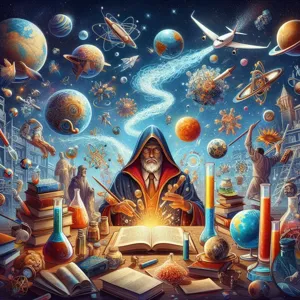
Fiction often serves as a powerful lens through which we can understand the complexities of history and science. While textbooks and academic papers present facts and data, novels, short stories, and even speculative fiction breathe life into these subjects, transforming dry dates and theories into vibrant narratives that resonate on a personal level.
Take, for example, the works of authors like Kurt Vonnegut or Margaret Atwood, who weave intricate tales that explore the moral dilemmas of scientific advancements and the repercussions of historical events. Through their storytelling, they invite readers to engage with profound ethical questions and societal implications that might otherwise remain abstract.
Fiction has the unique ability to create empathy, allowing us to step into the shoes of characters who navigate pivotal moments in history or grapple with the implications of scientific discovery. Books like “The Book Thief” by Markus Zusak not only recount the horrors of World War II but also illuminate the resilience of the human spirit in the face of adversity. Similarly, “The Martian” by Andy Weir combines rigorous scientific principles with a gripping survival story, making complex concepts accessible and engaging for readers who may not have a scientific background.
Moreover, speculative fiction often serves as a cautionary tale about the future. Works like George Orwell’s “1984” and Aldous Huxley’s “Brave New World” challenge us to consider the potential consequences of political and scientific developments, prompting critical reflection on our current societal trajectory.
In this way, fiction becomes more than just a form of entertainment; it acts as a crucial tool for understanding the past and envisioning the future. By engaging with these narratives, readers not only gain insights into historical and scientific contexts but also develop a deeper appreciation for the human experiences that shape our world. So, as you explore the vast landscape of history and science, don’t overlook the rich narratives woven through fiction—these stories offer invaluable perspectives that enrich our comprehension and spark curiosity in ways that facts alone cannot.
6. Books on Philosophy: Exploring Human Thought and Existence
Philosophy is the pursuit of understanding the fundamental nature of knowledge, reality, and existence. It’s a discipline that encourages us to question everything—from our beliefs and values to the very fabric of our being. Engaging with philosophical texts can provide profound insights into human thought and the complexities of life, making it an essential area of study for anyone seeking to unlock deeper knowledge.
In this section, we’ll explore some of the best books on philosophy that delve into the ideas of great thinkers throughout history. Start with classics like Plato’s “The Republic,” where the dialogue probes the meaning of justice and the ideal state. This foundational text not only introduces readers to philosophical inquiry but also sets the stage for discussions on ethics, politics, and the nature of reality.
Moving to the modern era, Friedrich Nietzsche’s “Thus Spoke Zarathustra” challenges conventional morality and invites readers to embrace individualism and the concept of the “Übermensch.” Nietzsche’s poetic style and provocative ideas encourage readers to reflect on their values and the societal norms that shape them.
For a more contemporary perspective, consider Daniel Kahneman’s “Thinking, Fast and Slow.” This book bridges psychology and philosophy, illuminating the dual systems that govern human thinking—intuitive and deliberative. Kahneman’s insights into cognitive biases and decision-making processes are invaluable for understanding the complexities of human behavior.
Finally, no exploration of philosophy would be complete without touching on existentialism. Jean-Paul Sartre’s “Existentialism is a Humanism” offers a powerful argument for personal freedom and responsibility, urging individuals to create their own meaning in an indifferent universe. His accessible prose makes complex ideas relatable and encourages deep reflection on personal existence.
By immersing yourself in these philosophical works, you’ll not only expand your intellectual horizons but also gain valuable perspectives on what it means to be human. Whether you’re questioning your beliefs, seeking clarity on ethical dilemmas, or simply curious about the nature of existence, these books provide a rich tapestry of thought that will resonate long after you’ve turned the last page.
7. Interdisciplinary Reads: Bridging History and Science
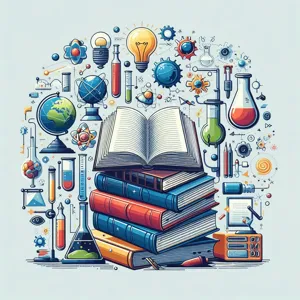
In a world that often compartmentalizes knowledge, interdisciplinary reads serve as a vibrant reminder of the interconnectedness of history and science. These books weave together threads from various disciplines, illuminating how historical events have shaped scientific discoveries and vice versa. By exploring the synergies between these fields, readers gain a richer understanding of both our past and the scientific principles that govern our present and future.
One standout title in this realm is “The Invention of Nature” by Andrea Wulf. This biography of Alexander von Humboldt, a naturalist and explorer, does more than recount his adventures; it delves into how his revolutionary ideas about nature influenced both science and the arts in the 19th century. Wulf’s narrative illustrates Humboldt’s profound impact on prominent figures like Darwin and Thoreau, effectively bridging the gap between scientific inquiry and historical context.
Another compelling read is “Guns, Germs, and Steel” by Jared Diamond. This Pulitzer Prize-winning work investigates the environmental and geographical factors that shaped the modern world. Diamond’s interdisciplinary approach combines anthropology, biology, and history to explain why certain civilizations thrived while others lagged behind, inviting readers to ponder the intricate interplay of chance and choice in human development.
For those interested in a more contemporary exploration, “The Gene: An Intimate History” by Siddhartha Mukherjee offers a captivating journey through the history of genetics. Mukherjee provides not only a scientific overview but also a historical narrative detailing how our understanding of genes has evolved over centuries. This book emphasizes the cultural and ethical implications of genetic science, making it a profound read for anyone curious about the implications of scientific advancements on society.
Interdisciplinary reads like these not only broaden our horizons but also foster critical thinking by exposing us to multiple perspectives. By examining the crossroads of history and science, readers are encouraged to consider how our past informs our present and shapes our future. Whether you’re a history buff or a science enthusiast, these books promise to enrich your understanding of both fields and inspire a lifelong curiosity about the world around us. Dive into these intersections of knowledge, and unlock a deeper comprehension of the complex tapestry of human experience.
8. Modern Classics: Contemporary Works That Shape Our Understanding
In the ever-evolving landscape of literature, modern classics stand out as contemporary works that not only reflect current societal values but also challenge our understanding of history, science, and the human experience. These books resonate with readers today, weaving rich narratives that stimulate thought and provoke critical discussions.
One such modern classic is “Sapiens: A Brief History of Humankind” by Yuval Noah Harari. This groundbreaking work takes us on a captivating journey through the history of our species, exploring the cognitive revolution, the agricultural revolution, and the scientific revolution that has shaped human societies. Harari’s ability to distill complex ideas into accessible prose makes this book a must-read for anyone interested in understanding the forces that have defined our existence.
Another notable mention is “The Immortal Life of Henrietta Lacks” by Rebecca Skloot, which intertwines the story of a poor African American woman whose cells were taken without her knowledge in the 1950s with profound ethical questions regarding medical research. This narrative not only sheds light on the scientific advancements made possible by HeLa cells but also addresses issues of race, class, and consent in medical ethics—making it a vital read in today’s context.
In the realm of science fiction, “The Overstory” by Richard Powers offers a poignant exploration of the interconnectedness of life through the lens of trees. This Pulitzer Prize-winning novel intertwines the lives of multiple characters, each connected to trees in unique and profound ways. Powers’ work compels readers to reconsider our relationship with nature and the urgency of environmental conservation.
These modern classics are more than just stories; they are essential texts that shape our understanding of the world. They invite us to engage with pressing issues, reflect on our past, and envision a future grounded in knowledge and empathy. As you explore these contemporary works, you’ll find that they not only enhance your appreciation for history and science but also inspire you to think critically about the challenges we face today.
9. Recommended Reading Lists by Subject
When it comes to enriching your understanding of various subjects, curated reading lists can serve as invaluable tools. They offer a carefully selected assortment of books tailored to specific interests, ensuring that both enthusiasts and newcomers alike can find something that resonates with them. Below, we’ve compiled a selection of recommended reading lists across history, science, and other fascinating topics, each designed to guide you on a literary journey through knowledge.
**History:**
For those intrigued by the past, diving into the lives and events that have shaped our world is essential. Our recommended history reading list includes classics like “Sapiens: A Brief History of Humankind” by Yuval Noah Harari, which offers a sweeping overview of human development, and “The Splendid and the Vile” by Erik Larson, a gripping narrative that chronicles Winston Churchill’s leadership during World War II. From ancient civilizations to modern political movements, these books weave compelling narratives that bring history to life.
**Science:**
Science enthusiasts will appreciate our curated list that spans a variety of disciplines, from biology to astrophysics. “A Brief History of Time” by Stephen Hawking is a must-read for anyone curious about the cosmos, while Rachel Carson’s “Silent Spring” is a powerful exploration of environmental science that continues to resonate today. These works not only educate but also inspire a deeper appreciation for the wonders of the natural world.
**Beyond the Basics:**
For readers seeking knowledge outside traditional categories, our list includes influential works from diverse fields. “Thinking, Fast and Slow” by Daniel Kahneman delves into the psychology of decision-making, while “The Immortal Life of Henrietta Lacks” by Rebecca Skloot intertwines science, ethics, and personal history into a compelling narrative. These selections demonstrate the interconnectedness of various disciplines, encouraging readers to think critically and expand their understanding.
**Conclusion:**
Whether you’re a history buff, a science geek, or someone looking to explore new territories of knowledge, these recommended reading lists by subject will help you unlock the doors to understanding. Each book serves as a stepping stone into broader discussions, inspiring curiosity and fostering a lifelong love of learning. So grab a cozy blanket, a cup of tea, and dive into these literary treasures—you never know where your next adventure in knowledge might lead you!
10. How to Choose the Right Book for Your Interests
Choosing the right book to dive into can be both an exhilarating and daunting task, especially with the vast array of options available in the realms of history, science, and beyond. The key lies in aligning your selections with your personal interests and goals. Start by reflecting on what topics intrigue you the most. Are you captivated by the intricacies of ancient civilizations, or does the latest breakthrough in quantum physics spark your curiosity? Identifying your passion is the first step in your literary journey.
Next, consider the format that resonates with you—do you prefer immersive narratives that transport you to another time and place, or are you more inclined towards informative texts that present data and theories in a straightforward manner? For those who enjoy storytelling, historical fiction or biographies can offer a compelling blend of fact and narrative, bringing historical figures and scientific discoveries to life in vivid detail. On the other hand, if you seek to deepen your understanding of complex subjects, look for well-reviewed non-fiction that breaks down intricate concepts into digestible insights.
Don’t hesitate to explore recommendations from trusted sources such as friends, online communities, or book clubs. Often, engaging with others can lead you to hidden gems that might not have crossed your radar. Additionally, platforms like Goodreads can provide personalized suggestions based on your reading history and preferences, helping you discover books that resonate with your interests.
Lastly, remember to keep an open mind. Sometimes, the most enriching experiences come from venturing outside your comfort zone. A book that initially seems unappealing might surprise you with its depth and relevance. Embrace the journey of exploration, and let your interests guide you as you unlock new knowledge, one page at a time.
11. The Importance of Diverse Perspectives in Historical and Scientific Literature
In the realms of history and science, the significance of diverse perspectives cannot be overstated. Engaging with a variety of viewpoints not only enriches our understanding of past events and scientific discoveries but also challenges the dominant narratives that often shape our knowledge. For centuries, historical accounts have frequently been told from a singular viewpoint, often sidelining the voices and experiences of marginalized groups. By exploring literature that includes these varied perspectives, readers gain a more nuanced understanding of history—one that is inclusive of different cultures, experiences, and interpretations.
Similarly, in the field of science, diversity of thought fosters innovation and creativity. When researchers from varied backgrounds—whether cultural, academic, or experiential—collaborate and share their findings, they can approach problems from unique angles, leading to breakthrough discoveries. Reading books that highlight the contributions of underrepresented scientists can inspire a new generation to pursue their passions in STEM fields while also promoting the idea that science is a collaborative and inclusive endeavor.
Moreover, literature that emphasizes diverse perspectives encourages critical thinking. As readers encounter contrasting viewpoints, they are prompted to question their own beliefs and assumptions, leading to a deeper and more comprehensive understanding of complex topics. Whether it’s delving into the history of marginalized communities or exploring scientific theories from multiple angles, these diverse narratives help to create a richer tapestry of knowledge.
In essence, to truly unlock the depths of knowledge in history and science, it is vital to seek out and embrace books that offer diverse perspectives. This approach not only enhances our understanding but also fosters empathy and connection in an increasingly complex world. So, as you build your reading list, consider incorporating titles that illuminate the myriad voices and stories that have shaped our past and continue to influence our future.
12. Audiobooks and Podcasts: Expanding Knowledge Beyond the Page
In our fast-paced world, where time is often a luxury, audiobooks and podcasts have emerged as invaluable tools for expanding knowledge beyond traditional reading. Imagine being able to delve into the depths of history or explore the wonders of science while commuting, exercising, or even cooking dinner. This flexibility allows you to absorb information in a way that fits seamlessly into your daily routine, enriching your mind without demanding a dedicated block of time.
Audiobooks offer a unique experience, bringing stories and concepts to life through the spoken word. Whether it’s a gripping narrative about a historical figure or a detailed account of a scientific breakthrough, the narration can add an emotional layer that text alone might not convey. You can enjoy works by renowned historians and scientists, narrated by skilled voice actors or even the authors themselves, making the content feel personal and engaging.
Podcasts, on the other hand, provide a dynamic platform for knowledge-sharing. With an endless array of topics, expert interviews, and discussions, they allow you to explore niche subjects or gain multi-faceted perspectives on broader themes. From deep dives into ancient civilizations to the latest discoveries in quantum physics, there’s a podcast out there for every curiosity. Many episodes are short enough to fit into a busy day, making it easy to learn something new during a lunch break or while running errands.
By integrating audiobooks and podcasts into your routine, you can create a rich tapestry of knowledge that complements your reading habits. This multi-modal approach to learning not only helps reinforce what you’ve read but also introduces you to new ideas and viewpoints, making your intellectual journey all the more fulfilling. So, grab your headphones, hit play, and unlock a world of knowledge that goes beyond the page.
13. Creating a Reading Plan for Lifelong Learning
Creating a reading plan for lifelong learning is not just about setting aside time to read; it’s about crafting a structured approach that aligns with your curiosity and goals. Start by identifying the subjects that ignite your passion—be it history, science, or any other field that piques your interest. Once you’ve pinpointed these areas, consider breaking them down into smaller, more manageable themes or topics. For instance, within history, you might explore ancient civilizations one month, and then shift to modern political movements the next.
Next, allocate specific times during your week dedicated solely to reading. This could be as simple as 30 minutes each morning with your coffee or a quiet hour before bedtime. The key is consistency; integrating reading into your routine will help foster a lifelong habit. To keep things engaging, mix up your formats—alternate between traditional print books, audiobooks, and e-readers. This variety not only enhances your learning experience but also accommodates different situations, whether you’re commuting, working out, or relaxing at home.
Moreover, don’t hesitate to annotate or take notes as you read. Jotting down insights or questions will deepen your understanding and create a personalized resource you can revisit later. Consider joining a book club or an online reading community to share your thoughts and gain new perspectives; the conversations that emerge can significantly enrich your learning journey.
Finally, set goals for what you want to achieve with your reading plan. Whether it’s finishing a specific number of books each year, exploring a new genre each month, or diving deep into a particular subject, having these objectives will motivate you to stay on track. Remember, the journey of lifelong learning is not just about accumulating knowledge; it’s about the joy of discovery and the connections you make along the way. By creating a thoughtful reading plan, you’ll open the door to a world of ideas that can inform and inspire you for years to come.
14. Joining Book Clubs and Discussion Groups for Deeper Insight
Joining book clubs and discussion groups can be a transformative experience for any reader looking to gain a deeper insight into their favorite subjects, whether it’s history, science, or any other genre. These groups provide a unique platform for engaging with fellow enthusiasts who share a common passion for literature, fostering a community where ideas can be exchanged, and diverse perspectives can be explored.
Imagine delving into a thought-provoking historical narrative or a groundbreaking scientific theory, only to emerge with a richer understanding after sharing your views with others. In a book club, each member brings their own interpretations, backgrounds, and experiences to the table, which can illuminate aspects of the material you might never have considered. This collaborative learning environment not only enhances your comprehension but also sparks lively debates that can challenge your viewpoints and encourage critical thinking.
Participating in discussions also helps solidify the knowledge you’ve gained from your reading. As you articulate your thoughts and respond to others, you reinforce your understanding and retention of the material. Additionally, many book clubs curate their selections around themes or specific topics, allowing you to explore wider contexts, historical backgrounds, or scientific implications that enrich your reading experience even further.
Moreover, book clubs can introduce you to titles and authors you may have overlooked. When a fellow member passionately advocates for a lesser-known work or an unconventional theory, it opens up new avenues for exploration, ensuring your reading list remains fresh and dynamic.
Whether you choose to join a local group that meets in coffee shops or participate in a virtual community that connects readers from around the globe, the benefits of engaging in book discussions are immense. Not only do you deepen your understanding of complex subjects, but you also forge connections with like-minded individuals who share your enthusiasm for learning. So, pick up that book, seek out a discussion group, and unlock a world of knowledge that awaits through the power of shared insights.
15. Conclusion: The Journey of Knowledge Through Reading
As we wrap up our exploration of the best books spanning history, science, and beyond, it’s essential to reflect on the profound journey that reading offers. Each book serves as a gateway, inviting readers to traverse different eras, dissect complex theories, and engage with innovative ideas that have shaped our understanding of the world.
Reading is not just an act of leisure; it is an adventure that fuels curiosity and ignites passion for learning. It connects us to the thoughts and experiences of those who came before us, allowing us to walk in their shoes and grasp the intricacies of human existence. Whether it’s the vivid narratives of historical events that transport us to another time or the enlightening explanations of scientific phenomena that encourage us to question and explore, every page turned is a step towards greater wisdom.
In a world overflowing with information, books remain a steadfast source of depth and insight. They challenge our perspectives, provoke discussions, and inspire change. As you embark on your personal reading journey, remember that every book has the potential to unlock new realms of knowledge, understanding, and empathy. So, gather your reading list, make time for those literary adventures, and let the words guide you through the vast landscape of human thought and discovery. The journey of knowledge is not just about accumulating facts; it’s about cultivating a lifelong love for learning that enriches both the mind and the spirit. Happy reading!
As we wrap up our exploration of the best books for history, science, and beyond, we hope you feel inspired to dive into the rich worlds these texts offer. Each book on our list serves as a gateway to understanding the complexities of human civilization and the wonders of the universe, inviting you to expand your horizons and engage with new ideas. Whether you are a seasoned reader or just beginning your literary journey, these works promise to enrich your mind and spark your curiosity. So grab your favorite reading nook, pour yourself a cup of tea, and embark on an adventure through the pages of knowledge. Happy reading, and may the stories and discoveries you encounter ignite a lifelong love for learning!

